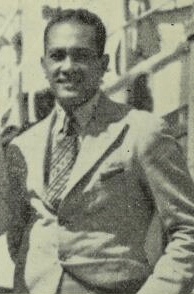Edward Cakobau facts for kids
Quick facts for kids
Edward Cakobau
|
|||||||||||||||||||||||||||||||||||||||||||||
|---|---|---|---|---|---|---|---|---|---|---|---|---|---|---|---|---|---|---|---|---|---|---|---|---|---|---|---|---|---|---|---|---|---|---|---|---|---|---|---|---|---|---|---|---|---|

Cakobau in 1937
|
|||||||||||||||||||||||||||||||||||||||||||||
| Deputy Prime Minister | |||||||||||||||||||||||||||||||||||||||||||||
| In office 1972–1973 |
|||||||||||||||||||||||||||||||||||||||||||||
| Succeeded by | Penaia Ganilau | ||||||||||||||||||||||||||||||||||||||||||||
| Member of the House of Representatives | |||||||||||||||||||||||||||||||||||||||||||||
| In office 1972–1973 |
|||||||||||||||||||||||||||||||||||||||||||||
| Succeeded by | Mosese Qionibaravi | ||||||||||||||||||||||||||||||||||||||||||||
| Constituency | Suva East National (Fijian) | ||||||||||||||||||||||||||||||||||||||||||||
| In office 1966–1972 |
|||||||||||||||||||||||||||||||||||||||||||||
| Constituency | Central Cross-Voting (Fijian) | ||||||||||||||||||||||||||||||||||||||||||||
| Minister for Commerce, Industry and Labour | |||||||||||||||||||||||||||||||||||||||||||||
| In office 1967–1972 |
|||||||||||||||||||||||||||||||||||||||||||||
| Member for Commerce, Industry and Tourism | |||||||||||||||||||||||||||||||||||||||||||||
| In office 1966–1967 |
|||||||||||||||||||||||||||||||||||||||||||||
| Nominated Member of the Legislative Council | |||||||||||||||||||||||||||||||||||||||||||||
| In office 1944–1966 |
|||||||||||||||||||||||||||||||||||||||||||||
| Personal details | |||||||||||||||||||||||||||||||||||||||||||||
| Born | 21 December 1908 Bau, Fiji |
||||||||||||||||||||||||||||||||||||||||||||
| Died | 25 June 1973 (aged 64) Suva, Fiji |
||||||||||||||||||||||||||||||||||||||||||||
|
|||||||||||||||||||||||||||||||||||||||||||||
Ratu Sir Edward Tuivanuavou Tugi Cakobau (born December 21, 1908 – died June 25, 1973) was an important leader from Fiji. He was a respected chief, a brave soldier, a skilled politician, and even a talented cricketer! He served in Fiji's government for many years, from 1944 until he passed away. He also held important jobs like Minister for Commerce, Industry and Labour, and later, Deputy Prime Minister.
Contents
Who Was Edward Cakobau?
Early Life and Family Connections
Edward Cakobau was born in December 1908. His father was King George Tupou II of Tonga. His mother was Adi Litia Cakobau. She was the granddaughter of Seru Epenisa Cakobau, who was the first King of Fiji. This means Edward had important royal connections in both Fiji and Tonga. He was also the half-brother of Queen Salote Tupou III of Tonga.
Education and Cricket
Edward went to school in New Zealand. He studied at Wanganui Technical College from 1923 to 1928. Then he went to Auckland Technical College. While in New Zealand, he played first-class cricket. This is the highest level of cricket below international matches. He played one match for the Auckland team in 1930–31. This was part of a competition called the Plunket Shield.
Later, he played two first-class matches for the Fiji team in 1948. These games were against teams from Otago and Auckland. After his time in New Zealand, he went to Wadham College, Oxford in England. There, he studied how to manage colonies.
Edward Cakobau's Career
Working for Fiji
After his studies, Edward Cakobau returned to Fiji. He first worked as a schoolteacher. Later, he became a civil servant. This means he worked for the government. He started as a clerk in the Native Affairs Department. He worked his way up to become the Deputy Secretary for Fijian Affairs.
In 1937, he was one of Fiji's representatives. He attended the coronation of King George VI in England. A coronation is a special ceremony. It marks the official crowning of a new king or queen.
Military Service and Awards
Edward Cakobau was also a brave soldier. During World War II, he served in the Solomon Islands. For his bravery, he received the Military Cross. This is an award given for acts of bravery during battle.
He later returned to military service. This was during the Malayan Emergency. This was a conflict in Malaya in the 1950s. He served there in 1953 and 1954. During this time, he became the commanding officer of the Fiji Battalion. For his service in Malaya, he was given the OBE. This stands for Officer of the Order of the British Empire. Later, he received a CBE in 1966. This stands for Commander of the Order of the British Empire.
Political Life and Leadership
In 1944, Edward Cakobau began his long political career. He was appointed to the Legislative Council. This was a group that helped govern Fiji. He was one of five Fijian members chosen for this role. He continued to be a member of this council for many years.
In the 1966 elections, he was elected without opposition. He represented the Fijian Central cross-voting constituency. After these elections, he was given an important role. He became the Member for Commerce, Industry and Tourism. In 1967, he became a Minister. This meant he was in charge of the government department for Commerce, Industry and Labour.
In 1971, he was knighted. This means he was given the title "Sir." In the 1972 elections, he was elected to the House of Representatives. This is like Fiji's parliament. After this, he was appointed Deputy Prime Minister. He worked alongside Kamisese Mara, who was the Prime Minister.
Later Life and Legacy
Edward Cakobau passed away on June 25, 1973. He was buried on Bau Island on June 29. He had four sons. His eldest son, Viliame Dreunimisimisi, was known for starting the first distillery in the South Pacific. He also served as a Minister for Tourism and Agriculture.
His second son, Epeli Nailatikau, also became a politician. He served as the Speaker of the House of Representatives. Later, he became the President of Fiji. His third son, Tu'uakitau Cokanauto, also became a minister. His fourth son was Keni Vuiyasawa. Edward Cakobau's family continued to play important roles in Fiji's history.
See also
- List of Auckland representative cricketers
 | Aurelia Browder |
 | Nannie Helen Burroughs |
 | Michelle Alexander |

